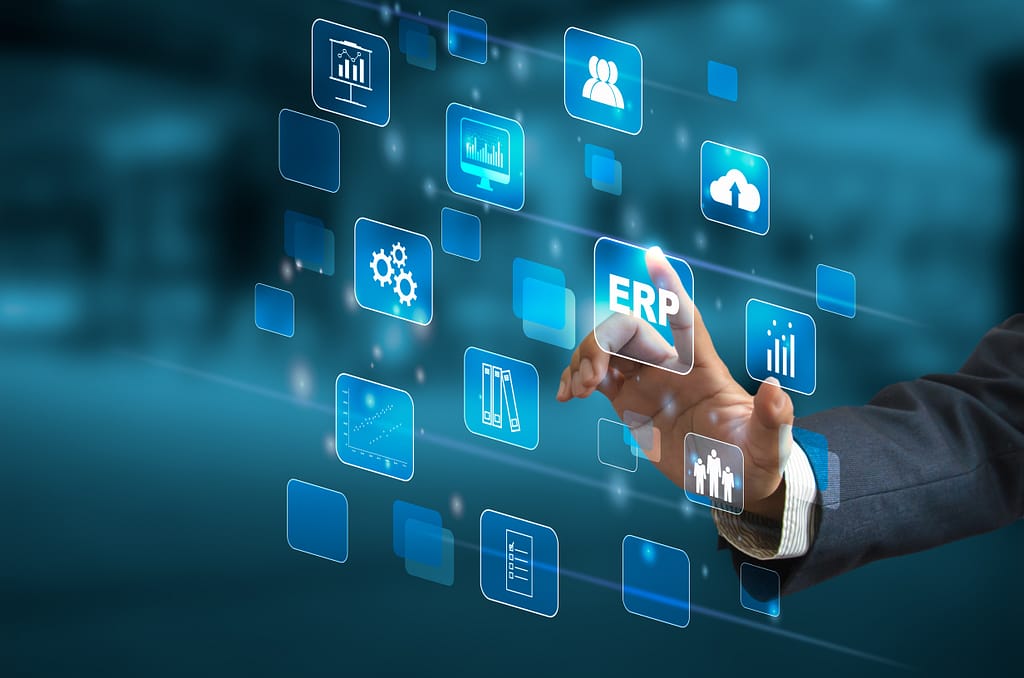ERP System Checklist outlines the factors to consider when selecting a business management system for your organization. This blog will assist you in selecting the system that will be most beneficial to your organization.
Choosing the proper ERP system is of the utmost significance since it may bring order to chaos by integrating and automating the organization’s business activities. With improved financial and operational transparency, the company might significantly enhance its performance and overall output.
To identify the ideal business solution, it is crucial to conduct thorough research and map out business requirements in advance.

How does Enterprise Resource Planning (ERP) benefit a business?
ERP is an acronym for Enterprise Resource Planning; this software integrates the fundamental business processes of an organization by utilizing a shared database to support and connect various business activities. ERP streamlines and automates various organizational tasks, including accounting, inventory management, order processing, and human resources management, among others.
ERP assists firms by offering a centralized source of real-time data that enables effective decision-making and aids in automating procedures. ERP dashboards and other reporting tools provide a real-time view of data and information from across the enterprise.
What are the ERP Implementation Methods?
There are two options for deploying ERPs: in the cloud and on-premises. Cloud-based ERP systems are those ERPs that are deployed on the vendor’s cloud and offer lower upfront costs due to the absence of hardware installation requirements. Businesses can access ERP through the internet on any browser-enabled device (PC, Mobile, or Tablet), and these solutions are typically offered on a subscription basis and using the Software-as-a-Service model (SaaS). Additionally, cloud-based implementation is faster and less complicated than on-premises setup. Even software updates are delivered automatically by the provider in conjunction with periodic new releases.
On the other hand, on-premises ERP solution requires more time to deploy and is a costly choice due to the need for server-side hardware installation. The corporation alone is responsible for maintaining and improving the system. This form of ERP solution is appropriate for businesses who wish to maintain their data on their own server and have substantial IT capabilities. Companies that choose on-premises implementation typically pay a substantial licensing cost at the time of purchase in addition to recurring maintenance fees.

Acquisition Considerations
There is more to make it happen than selecting the right software and tools. Choosing an ERP for your organization is a significant choice, as is selecting the correct vendor to execute the system. Before choosing an ERP, it is necessary to consider a number of crucial factors.
Business Future: The deployment of an ERP system will transform your business processes. It will overhaul the entire business model, and you will be unable to return to your previous system. It is crucial to have a checklist of your business requirements, the number of users who will be working on the ERP system, and what you can accomplish with it, as the future of the business and business objectives will depend on the ERP system’s performance.
Business Requirements: An ERP can support and cover any business requirement; the system has the capacity to meet any business requirements. Once the ERP system has been established, it is recommended to identify, assess, and prioritize the business requirements that are most significant and demand immediate attention.
System Usage: While an ERP system can address all your business problems and offer you with a consolidated database, automated procedures, and business function integration, it can still fail if your employees do not adopt the new system. It is essential to determine which users will utilize the ERP system, and these users must be certified and adequately taught.
Budget: If you have chosen an ERP system for your company, the following step is to determine how much you are willing to invest in the new system. You should select a system or vendor within your budgetary constraints.
Deployment: If you are cautious about your data, on-premises implementation is suited for you. You will have your data operating on the company’s server, even though this will be a costly choice requiring substantial investments in hardware and infrastructure. Another alternative would be to put ERP on the vendor’s cloud, which would provide the business with the option to use the system as Software-as-a-Service (SaaS). The organization can access the system via an internet browser on any device, including PC, Mobile, and Tablet. On-cloud implementation is typically offered on a subscription basis, and no hardware installation is required. A hybrid strategy, which is a combination of cloud and on-premises deployment, is another possibility.

Vendor: Every company requirement is unique and requires a vendor with industry-specific expertise. The ERP vendor should have a solution that meets your business’s needs, and you should receive support following adoption.
Partner Vendor Ecosystem: Select an ERP provider with a robust Partner Vendor Ecosystem. If you select an ERP vendor that does not have a comprehensive Partner Vendor Ecosystem, post-implementation assistance will be costly because the market’s resources will be limited and will determine costs.
Software Options: When selecting an ERP system, your organization may have business requirements, but these requirements may alter in the future. While shopping for an ERP system for your organization, seek a solution that is scalable and capable of meeting future business needs.
Add-ons: Check that the ERP solution you’re considering for your business can integrate with any third-party applications that your present legacy system utilizes or may use in the future. By integrating the ERP system with your present legacy system, you might save a substantial amount of money.

ERP System Checklist
If you are not customizing your ERP requirement, or even if you are customizing it, the following is a required Checklist of business modules an ERP covers and what most firms select when deciding on an ERP system.
Accounting and Financial Management: Businesses must maintain track of vast volumes of financial data generated by diverse b2c or b2b sales, procurement, overhead expenses, taxes, and everyday operational transactions. ERP automates financial processes and provides a consolidated picture of data for improved decision-making.
Financial Module should have financial reporting, accounts receivable (AR), accounts payable (AP), billing, general ledger, revenue recognition, and budgeting functionality.
Manufacturing and Distribution: ERP supports all manufacturing modes, including discrete, process, and mixed-mode production. It simplifies and automates the manufacturing and production processes, hence increasing the overall production and order processing capacity.
A quality ERP module should incorporate production control, quality analysis, distribution scheduling, and warehouse management capabilities.
Human Capital Management: An ERP’s Human Capital Module should include features like as onboarding, payroll, benefits, productivity, taxes, timecard tracking, and time off requests.
The HCM module maintains and streamlines employee information and other human resource data for managers.

Materials Management: Through the Material Management component of ERP, firms may improve the supply chain process and ensure they have sufficient materials for manufacturing as planned.
Material Management’s functionalities should include automated procurement, logistics, and inventory management.
Inventory and Procurement: An inventory and procurement component of the ERP gives a real-time view of the business’s available inventory and distributes the information with other business departments, such as sales, distribution, marketing, and production, among others. It contributes to enhanced planning and cost savings.
Supply Chain Management: The Supply Chain Management module includes demand forecasts, work orders, purchase orders, transfer order automation, shipping, and warranty management.
Collaboration with suppliers’ aids in maintaining a robust, integrated, flexible, and resilient supply chain in the organization.
Customer Relationship Management: A Customer Relationship Management module connects your firm to your clients and facilitates the management of all contacts and communications with them. It facilitates collaboration and automates client history, marketing collateral, leads, and sales quotation generation.
Project Management: ERP’s ability to integrate project-related data with diverse corporate activities enables more efficient project management and planning.
Business Intelligence and Reporting: With the cross-functional reporting tools given in the form of dashboards and analytics, firms can make more informed judgments and prioritize crucial decisions.
This functionality has the potential to revolutionize how a business run.

Final Statement
If your present accounting system has outgrown your business requirements and you are going to build an ERP system to manage your business processes, the above blog will assist you in contemplating the dos and don’ts for your ERP. During the ERP selection process, if there are any unanswered questions or unexplored areas, our consulting staff will be more than delighted to address them over the phone.
Smart App Business Solutions is a Microsoft Gold Partner and Microsoft reseller for Dynamics 365 Business Central licenses. We implement all modules of Dynamics Business Central for customers. If you need more information, please contact us on 1800 72 27 28 | [email protected]


